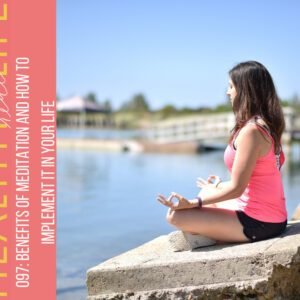Meditation strategies
Sharing different types of meditation strategies and how to implement them into your routine!
Hiii! How are you? I hope you’re enjoying the morning! The Pilot is off work today (wahoo!) so I’m going to see if I can convince him to join me for F45 cardio day and then we’re going to grab coffee, breakfast, and maybe enjoy multiple consecutive sentences of adult conversation. What a treat!
For today’s post, I wanted to chat a bit about meditation and the different types of strategies. Meditation is something that’s been on and off in my life, but I’ve been pretty consistent for the past year. It makes a huge difference in my day. I feel centered, calm, and it’s one of my favorite daily rituals. I plug in my PEMF Go Mat (use FITNESSISTA15 for a discount), do 10 minutes of an eye mask while I meditate, and then I pray and journal. If I have extra time, I stay on the Go Mat a little longer and work on NYT Spelling Bee.
There are so many different meditation strategies out there, and it can be a little overwhelming, especially if you’re a beginner.
For today’s post, I wanted to break down some of the most common methods of meditation and how to use them in your routine.
*A friendly reminder that it’s helpful to have a designated meditation space that isn’t your bed! You don’t want to associate this space with anything else.Also, make sure that it’s free of work and clutter; you don’t want laundry and to-do lists to stare at you in the face as you’re trying to relax.
For more meditation tips, check out this post.
Meditation strategies
Guided meditations
If you’re new to meditation or find it challenging to focus, guided meditations can be an invaluable aid. These pre-recorded sessions are led by experienced practitioners who gently guide your thoughts and breath, helping you find your center. Choose from a myriad of meditation apps or online resources offering guided sessions tailored to various goals, from stress relief to improved focus. Some of my favorite include the Peloton app, Calm, and Headspace.
Breathwork
Breathwork is the heart and soul of meditation, weaving a profound connection between your mind and body. Practice deep belly breathing to calm your nervous system and bring your attention inward. Pay attention to each inhale and exhale, allowing your breath to be your anchor in the present moment. I like to do box breathing (in for 8, hold for 8, out for 8), or the 6-7-8 method (in 6, hold 7, out for 8). Next-level: think of a word on the inhale and another word you want to feel on the exhale, or think of something you’re grateful for on each exhale.
Mindfulness
Mindfulness meditation is about cultivating awareness of the present moment without judgment. Bring your attention to the sensations, thoughts, and emotions flowing through you. Acknowledge them, but avoid getting entangled in their narrative. By observing without judgment, you can gain insight into your inner landscape and foster acceptance. One of my favorite strategies is called basking: paying attention to, and taking enjoyment in, tiny, specific details. Try to think about something you can, see, touch, smell, hear, and taste, as you breathe.
Moving meditation
For those who find sitting meditation challenging, walking meditation can be a blissful alternative. Go for a stroll in a quiet park or natural setting. Focus your attention on the sensation of each step, the rhythm of your breath, and the connection between your feet and the earth. This moving meditation allows you to integrate mindfulness into your daily activities, especially when stillness can be challenging.
Visualization
Visualization meditation involves imagining a serene place or a desired outcome. Close your eyes and create a mental picture of a calming beach, lush forest, or any scene that resonates with you. Visualize yourself in that space, soaking in its tranquility. This technique helps alleviate stress and empowers you to manifest your aspirations. There are tons of visualization meditations on YouTube!
Progressive muscle relaxation
PMR is like a magical massage for your mind and body, and the best part is, you can do it anywhere, anytime! You systematically tense and then release different muscle groups in your body, melting away tension and inviting in total relaxation. It’s like a symphony of serenity that tunes your body to a state of pure tranquility. This technique isn’t just about letting go of physical tension; it also works wonders for calming a restless mind, and can be especially beneficial before bed.
Sound bath meditation
It’s a sensory delight where you’ll be immersed in a harmonious blend of sound vibrations produced by various instruments like singing bowls, gongs, chimes, and drums. As these enchanting sounds wash over you, you’ll feel tension melt away, and your mind will quiet like a still pond. Recently, I got to try a sound bath meditation at Miraval, and we floated in little hammocks as the healing sound frequencies surrounded us. It was magical, I tell ya.
So, tell me, friends: what is your favorite type of meditation? How often do you meditate in your routine??
Let this post your friendly reminder to get in a lil Zen time today.
xo
Gina

















Thank you for the med tips! I love spelling too hahaha!
I’m looking through the post- is there a huge typo I missed??? I always think I’ve edited them and then find things later
Oh no typo! i was relating to you! referring to the NYT spelling bee you do during meditation: )
hahah i get it now! 🙂